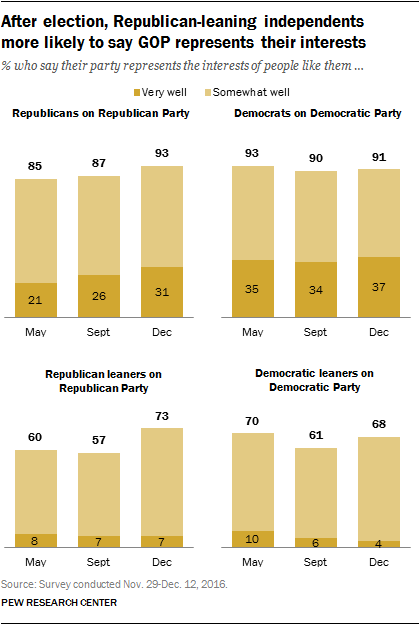
In the wake of Donald Trump’s victory, Republicans are feeling better about their party than they did during the campaign.
Republicans and Republican-leaning independents increasingly say their party does well in representing the interests “of people like them.” Republicans’ optimism about the GOP’s future also has risen since the election.
Democrats also generally continue to say their party does well in representing their interests, but they are less optimistic about the Democratic Party’s future than they were during the campaign.
Today, fully 93% of Republicans say the party represents the interests of people like them at least somewhat well. A somewhat smaller majority of Republicans said this in May (85%) and in September (87%). The share saying the GOP represents their interests “very” well has risen 10 percentage points since May (from 21% to 31%).
Democrats, like Republicans, overwhelmingly say the party does at least somewhat well in representing people like them (91% say this). These views are little changed from earlier this year.
Shifting views of the parties’ futures
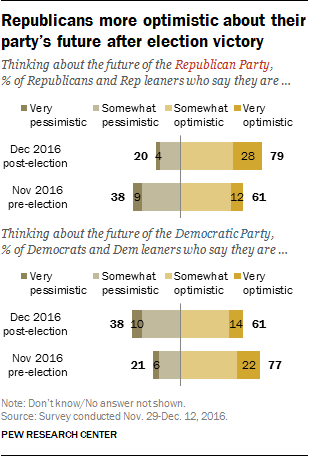
In November, prior to the election, more Democrats than Republicans expressed optimism about the future of their party. But these views have flipped in the wake of the GOP’s victory on Nov. 8.
Today, 79% of Republicans and Republican leaners are optimistic about the future of the Republican Party, while just 20% are pessimistic. In November, a smaller majority of Republicans (61%) said they were optimistic about the party’s future. About twice as many Republicans today say they are “very” optimistic as said this before the election (28% vs. 12%).
Among Democrats, by contrast, views have moved in the opposite direction. Before the election, about three-quarters of Democrats and Democratic leaners (77%) said they were at least somewhat optimistic about the future of the Democratic Party, compared with just 21% who said they were somewhat or very pessimistic. Following Trump’s election, 61% now say they are optimistic, while 38% express pessimism over the future of the Democratic Party.
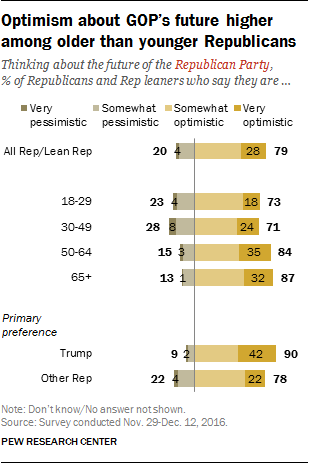
Among both Republicans and Democrats, older people express more optimism about their party’s future than do younger people.
Fully 85% of Republicans and Republican leaners 50 and older say they are optimistic about the GOP’s future, including 34% who are very optimistic. Among Republicans under 50, 71% are optimistic, with 22% saying they are very optimistic.
Republicans who supported Trump in the GOP primaries also are somewhat more likely than those who supported another candidate to say they are at least somewhat optimistic about the party’s future, though majorities of both say this (90% vs. 78%).
Those who supported Trump are far likelier to say they are very optimistic than those who favored another candidate: 42% of Trump primary supporters say they are very optimistic, compared with about a quarter (22%) of supporters of another candidate.
Among Democrats, there are similar patterns in views of the party’s future. In particular, Democrats who backed Clinton in the primaries are much more optimistic about the party’s future than are those who backed other Democrats for the nomination.
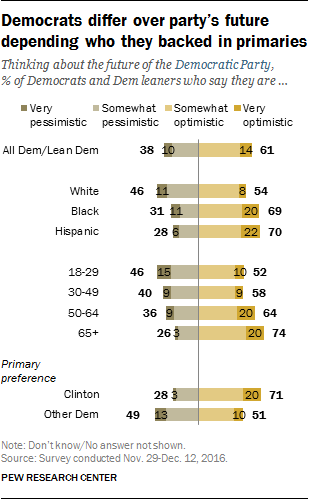
A 71% majority of Democrats who supported Hillary Clinton in the primaries express optimism about the future of the party, while 28% say they are somewhat or very pessimistic. Those who supported another candidate in the Democratic primaries are divided on the future of the party: While 51% say they are at least somewhat optimistic, 49% are pessimistic about the party’s future.
As with Republicans, there are age differences among Democrats regarding the party’s future. Younger Democrats express mixed views about the future of the Democratic Party: Only about half of those under 30 (52%) are optimistic, while 46% say they are pessimistic. By comparison, about three-quarters of Democrats ages 65 and older (74%) say they are optimistic.
Black and Hispanic Democrats also are far likelier than white Democrats to say they are at least somewhat optimistic: Nearly seven-in-ten blacks (69%) and Hispanics (70%) say they are optimistic. By contrast, far fewer white Democrats (54%) say this, including just 8% who say they are very optimistic.
Views of parties’ efforts to address concerns of groups in society
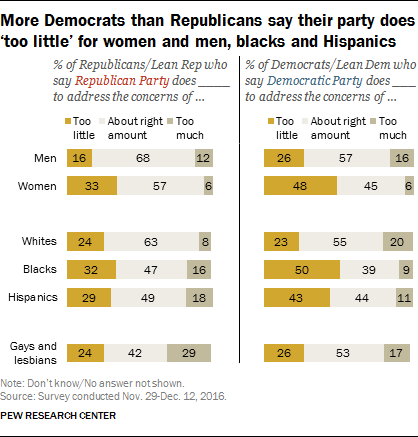
Asked whether their own party does too much, too little or the right amount to address the concerns of several groups in society, Republicans and Democrats have very different assessments of their party’s efforts.
Democrats are more likely than Republicans to say their party does “too little” to address the concerns of many groups, including blacks, women, Hispanics and men.
Half of Democrats and Democratic leaners say the Democratic Party does too little for blacks; 39% say it does about the right amount, while 9% say it does too much.
By contrast, only about a third of Republicans and Republican leaners (32%) say their party does too little for blacks. Republicans are more likely than Democrats to say their party does the right amount (47% vs. 39%) or too much (16% vs. 9%) for blacks.
Nearly half of Democrats (48%) say their party does too little to address the concerns of women; only 33% of Republicans say the same. More Democrats than Republicans also say their party does too little for Hispanics (43% vs. 29%) and men (26% vs. 16%).
About as many Republicans (24%) as Democrats (23%) say their parties do too little for whites; majorities in both parties say they do about the right amount (63% of Republicans, 55% of Democrats). However, more than twice as many Democrats (20%) as Republicans (8%) say their party does too much for whites.
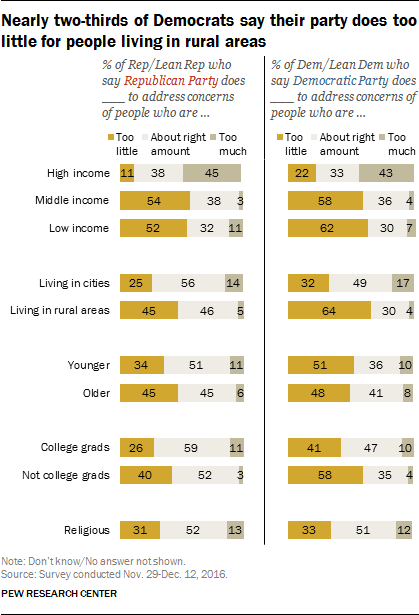
Comparable shares of Republicans (24%) and Democrats (26%) also say their party does too little to address concerns of gays and lesbians. But more Republicans (29%) than Democrats (17%) say their party does too much for gays and lesbians.
Republicans and Democrats both think their party does too little for middle-income and lower-income people, though Democrats are slightly more likely to think the Democratic Party does too little for lower-income people (62%) than are Republicans when it comes to the GOP (52%).
Partisans also are equally likely to say their parties have done too much for higher-income people: 45% of Republicans think this about the Republican Party, as do 43% of Democrats about the Democratic Party.
However, Democrats are more likely than Republicans to fault their party’s efforts in addressing the concerns of people living in rural areas. Nearly two-thirds of Democrats (64%) say their party does too little to address the concerns of people living in rural areas; fewer Republicans (45%) say the same about the GOP.
And while Republicans and Democrats express similar views of their own party’s efforts for older people, about half of Democrats (51%) – compared with just 34% of Republicans – say their party does too little for younger people.
Nearly six-in-ten Democrats (58%) say their party does too little to address the concerns of people who have not graduated from college, while 41% say the party has done too little for college graduates. Fewer Republicans say their party has done too little for both groups: 40% say the party has done too little for people who have not completed college, while 26% say the same about the party’s efforts to address concerns of college graduates.
Republicans and Democrats have similar views of the way their party has dealt with the concerns of people who are religious. About half of Republicans (52%) and Democrats (51%) say their party has done about the right amount to address the concerns of religious people.
Trump’s election seen as harbinger of change for GOP
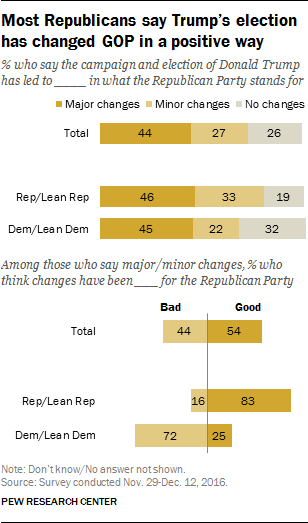
Overall, 44% of the public thinks the campaign and election of Donald Trump have led to major changes in what the Republican Party stands for, and another 27% think these have led to minor changes in the party. Just about a quarter of the public (26%) thinks his campaign and election have not led to changes in what the party stands for.
Both Republicans and Democrats share the opinion that Trump’s campaign and victory have led to changes in the GOP. Among Republicans and Republican leaners, about eight-in-ten think Trump has led to major (46%) or minor (33%) changes. Similarly, a comparable share of Democrats think his election has led to either major (45%) or minor (22%) changes in what the Republican Party stands for.
Among the majority who think his campaign and election have led to major or minor changes, 54% think these changes have been good for the Republican Party, while fewer (44%) think they have been bad for the GOP.
While partisans agree the election of Trump has led to changes in the GOP, Republicans and Democrats are deeply divided in their assessments of this change. A wide majority of Republicans and Republican leaners who say there have been changes say the impact has been positive: fully 83% think the changes have been a good thing, while just 16% think the changes have been bad for the party.
By contrast, among Democrats who think there have been changes in the Republican Party, 72% say they have been bad for the GOP, while 25% say they have been good.